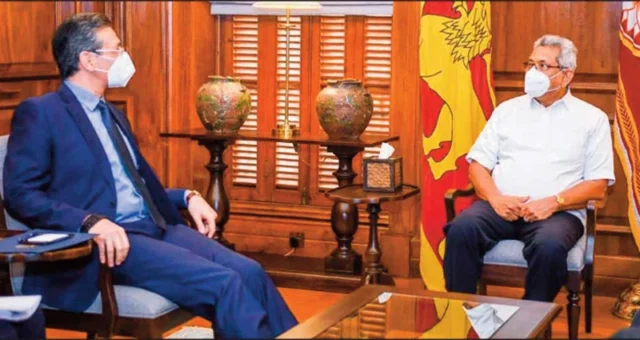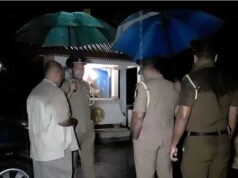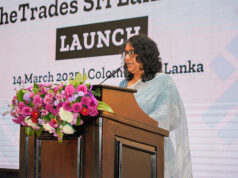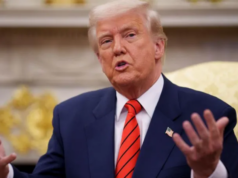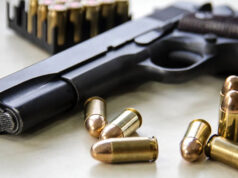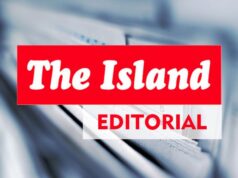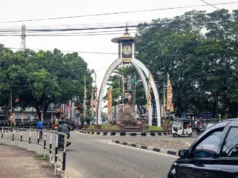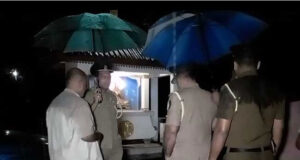While the country was rapidly heading for an unprecedented political, economic and social crisis, then President Gotabaya Rajapaksa, in the first week of June 2021, received Director of the USAID Sri Lanka Office, Reed J. Aeschliman, at the Presidential Secretariat. Among those present were Deputy Chief of Mission at the US Embassy Martin Kelly, USAID Programme Director Chistopher Foley, Secretary to the President P.B. Jayasundera, Finance Secretary S.R. Attygalle and Director General of External Resources Department at the Finance Ministry Ajith Abeysekera. Following the meeting, the President’s Office announced that steps would be taken to accelerate development programmers funded by the USAID. Perhaps, the former President should inquire whether the USAID actually provided any assistance to the public sector during his presidency.
By Shamindra Ferdinando
The United States Agency for International Development (USAID) never hesitated to provide funding for any project at any level as long as they aligned primarily with the overall US political and even sinister objectives. The beneficiaries ranged from Parliament to media organizations and even individuals.
In August 2024 the USAID partnered with Neon and Echelon Media to host the Shine 50 Awards at the Oak Room Ballroom, Cinnamon Grand. According to the organizers the event was meant to celebrate 50 young women making remarkable contributions across Sri Lanka.
Ambassador Julie J. Chung was there to recognize women aged 18 to 35 who were described as driving change in diverse fields, such as entrepreneurship, environmental advocacy, the arts, science, and technology. That was a minor thing by their standards or level of operations.
It would be pertinent to mention that USAID operations here should be examined taking into consideration developments in the wake of Maithripala Sirisena’s triumph at the 2015 January presidential election.
President Donald Trump has taken steps to neutralize USAID in line with an overall strategy meant to cut down on external spending. Those who had been receiving US funding on various pretexts are aghast over the unexpected development. However, Trump has suffered an initial setback due to the US District Judge Carl Nichols temporarily blocking the new administration from putting over 2,000 USAID employees on paid leave. Nichols agreed with two federal employee associations seeking a pause in the administration’s plans to put USAID employees on paid leave.
The Yahapalana government of Sirisena and Premier Ranil Wickremesinghe had a treacherous understanding with the US. Their operation began with the Yahapalana duo betraying the war-winning armed forces at the Geneva based United Nations Human Rights Council (UNHRC), in early Oct. 2015, where they helped move a war crimes resolution against one’s own country, possibly a world first.
While USAID spent as much as USD 7.9 mn (what a gravy train?) to teach Sri Lankan journalists how to avoid “binary-gendered language”, attracted public attention recently, far bigger issues have been conveniently ignored. In other words, the US promoted and encouraged the LGBTGQ (lesbian, gay, bisexual, transgender, and queer) project here. Do not forget that SLPP National List MP and Attorney-at-Law Premanath Dolawatta perhaps realising which way the wind was blowing, jumped on that band wagon and presented a Bill in support of LGBTQ people in Parliament in April 2023.
USAID intensified its operations here during Sirisena’s presidency. Having secured the executive presidency, with the backing of the UNP-TNA-JVP combine, Sirisena had no option but to go with Wickremesinghe’s agenda. The US orchestrated the Geneva betrayal with the support of the Yahapalana government and the TNA. Those who now represented the main Opposition SJB had been with the UNP and should be also held accountable for the great betrayal of our armed forces.
The UNP and Maithripala Sirisena’s SLFP fully cooperated on the high profile USAID project. Karu Jayasuriya, the incumbent head of the so-called National Movement for Social Justice (NMSJ), as the then Speaker, should be able to explain the circumstances in which Parliament finalized an agreement with the USAID worth USD 13.7 mn (Rs 1.92 bn).
Perhaps the current Parliament can examine the outcome of the high-profile USAID project launched in late November 2016. Interestingly, USD 3 mn had been released in September 2016 before the official launch of the project.
Parliament announced the USAID project in the wake of Sri Lanka becoming the newest member of the United States’ House Democracy Partnership programme which purports to support peer-to-peer exchanges for partner legislatures around the world.
The signing of the agreement took place in Washington DC on Sept. 14, 2016. Speaker Jayasuriya and US Congressman Peter J. Roskam, Chairman of the House Democracy Partnership, signed on behalf of the Sri Lanka Parliament and the House Democracy Partnership, respectively.
Jayasuriya was accompanied by Deputy Minister of Power and Renewable Energy Ajith P. Perera, Deputy Minister of Parliament Reform and Mass Media Karu Paranavithane, State Minister for City Planning and Water Supply Dr. Sudarshini Fernandopulle, Secretary General of Parliament Dhammika Dasanayake and Sri Lanka’s Ambassador to the United States of America Prasad Kariyawasam.
The Parliament certainly owes an explanation as to the improvement made in terms of the three-year Strengthening Democratic Governance and Accountability Project (SDGAP) geared to improve strategic planning and communication within the government and Parliament, enhance public outreach, develop more effective policy reform and implementation processes, and increase political participation of women and underrepresented groups in Parliament and at a local level.
All know that Parliament deteriorated further during the operation of that particular USAID project. The launch of the SDGAP project took place after the UNP, led by Ranil Wickremesinghe, who also served as the Prime Minister, engineered the massive Treasury bond scams in Feb. 2015 and March 2016.
The people have a right to know how the USAID funds were spent and whether stated objectives were achieved, especially in light of former US Secretary of State John Kerry having crowed publicly about how they brought about undemocratic secret regime changes here and elsewhere after spending hundreds of millions of dollars. Having disclosed that the US spent USD 585 mn during that period for such operations Kerry perhaps unintentionally declared that Myanmar, Nigeria and Sri Lanka were the recipients of State Department funding for those clandestine projects.
Maryland-headquartered Development Alternatives, Inc. (DAI) implemented the project intended to reform the public sector in accordance with an agreement between Sri Lanka and the House Democracy Partnership of the US House of Representatives.
During the implementation of that USAID project, Speaker Jayasuriya retained retired controversial career diplomat Prasad Kariyawasam as his advisor. Kariyawasam, who had served as the Foreign Secretary after being Sri Lanka’s Ambassador in Washington, was on the USAID payroll. Kariyawasam earned the wrath of the JO/SLPP and various other parties. They accused him of promoting US interests, both in and outside Parliament. Even as Sri Lanka’s Ambassador in Washington, he figured in a rather embarrassing press conference with TNA Parliamentarian M.A. Sumanthiran, where the latter asserted that there was a tripartite agreement on the setting up of a hybrid court to investigate accountability issues in Sri Lanka, meaning war crimes.
People have forgotten how the US backed retired General Sarath Fonseka’s candidature (Sirisena promoted him Field Marshal in 2015) at the 2010 presidential election. How the US and the UNP ensnared the Sinha Regiment war hero is still a mystery and the 2009/2010 US project that also involved the JVP didn’t do Fonseka any good.
Target political parties
Sri Lankans love freebees. Our politicians and officials are no exception. They are never satisfied. Karu Jayasuriya created history when he requested China to arrange MPs in Yahapalana Parliament to visit China. Of the 225 MPs, nearly 200 received free trip. Sri Lankan lawmakers also received nearly 240 laptops from China in August 2017. China gifted the laptops worth $ 293,000 on a request made by Speaker Jayasuriya. What our lawmakers did with those laptops to enhance their efficiency is nothing but a mystery.
By the time our MPs concluded group visits to China and Parliament installed laptops, the Yahapalana government finalized an agreement on Hambantota port with China. It gave a 99-year lease on the Hambantota port in 2017 for USD 1.2 bn which is an utterly controversial but irreversible agreement that jeopardized Indo-Lanka relations. As to what the Yahapalana government, which practiced anything but good governance, did with that money and more than USD 12 billion it borrowed at high interest from the international bond market for no apparent reason, is anybody’s guess; perhaps only thing it achieved was causing an unprecedented foreign exchange crisis that led to the unceremonious downfall of the succeeding SLPP government of Gatabaya Rajapaksa.
Our political parties never refused anything. Fully paid foreign trips are something our lawmakers cannot decline under any circumstances. That is the ugly truth.
In the midst of political, economic and social turmoil against the backdrop of the country being declared bankrupt, the Women Parliamentarians’ Caucus’ visit to New Zealand in July/August 2023 grabbed public attention.
So much so, Secretary General of Parliament Kushani Rohanadeera issued a brief statement to explain the position of the Parliament. Rohanadeera insisted that public funds weren’t utilized. The funding was provided by Sri Lanka’s development partners. The initiative launched two and half years ago, never received public funding and the visit was meant to gain experience from developed countries in the Commonwealth.
The group consisted of Dr. Sudarshini Fernandopulle (SLPP), Dr. Sitha Arambepola (SLPP), Rohini Kumari Wijeratne (SJB), Pavithradevi Vanniarachchi (SLPP), Geetha Samanmalee Kumarasinghe (SLPP), Thalatha Atukorale (SJB), Kokila Gunawardena (SLPP), Mudita Prishanthi (SLPP), Rajika Wickramasinghe (SLPP), Manjula Dissanayake (SLPP) and (Dr.) Harini Amarasuriya (JJB). Secretary General of Parliament Kushani Rohanadeera, Assistant Director (Administration) Indira Dissanayake and Media Manager of Parliament Nimmi Hathiyaldeniya accompanied the delegation. Having left the country on 24th July, the group concluded the visit on 3rd August.
The US provided the funding. The National Democratic Institute (NDI), with funding provided by the USAID, organized the tour undertaken by the Women Parliamentarians’ Caucus.
In addition to the USAID, the NDI works closely with the National Endowment for Democracy, the US Department of State and the Consortium for Elections and Political Process Strengthening (CEPPS). The above-mentioned organisations are well known around the world for sponsoring such initiatives, in line with furthering US interests.
The US fully sponsored another parliamentary delegation in Oct. 2023. Chairpersons of all Oversight Committees were invited, while denying patriotic Chairman of Oversight Committee on National Security Rear Admiral (retd.) Sarath Weerasekera, MP, the opportunity to join the delegation. That visit, too, had been organized by the NDI with the funding provided by USAID.
According to the US Embassy here they have provided more than US $2 billion (Rs. 598 billion) in assistance to Sri Lanka since 1956 (over a period of 68 years) to support Sri Lanka’s agriculture, education, health, environment, water, sanitation, infrastructure, governance, and business development and provide humanitarian assistance. Over the last seven decades, US support has helped modernize Sri Lanka’s diesel coaches, supported its thriposha supplemental nutrition programme, supported the development of electric vehicle charging stations., and empowered women entrepreneurs to drive economic growth, the Embassy has stressed.
Funding for BASL
The Bar Association of Sri Lanka is another major recipient of USAID funding. Over the years, USAID has become an indispensable partner for the BASL as the former generously provided the required funding.
The USAID is believed to be the main external sponsor of the BASL while from time to time BASL asked for sponsorship from the Colombo Port City as well as Perpetual Treasuries Limited (PTL), still suspended for perpetrating Treasury bond scams.
USAID financial backing had been so vital for the BASL, Ambassador Julie Chung attended the two-day National Law Conference (NLC) in March 2023 as the Guest of Honour. BASL invited Ambassador Chung in spite of continuing controversy over her direct alleged role in the overthrowing of President Gotabaya Rajapaksa. The BASL defended the decision on the basis of continuous USAID financial backing for several legal education programmes, conducted by the BASL, under the Effective & Efficient Justice (EEJ) Programme, and several other programmes.
Ambassador Chung addressed the final session of the National Law Conference held at the Grand Hotel Nuwara Eliya over a period of three days in the first week of June 2023. Less than a year later the shocking disclosure of BASL-JICA controversy over disbursement of funds received from the latter and the unceremonious resignation of BASL President Kaushalya Nawaratna, PC, in mid-September 2024 underscored the gravity of the situation. JICA handled the developments carefully as the bankrupt country learnt about corruption in a JICA-funded anti-corruption project.
The Bar Council, the apex body of the BASL unanimously asked Nawaratna to step down after it was proved that he failed to act with transparency in respect of the contract entered into by the BASL with JICA, dated Dec 11, 2023, and thereby violated the trust reposed in him as its President.
Although various NGOs receiving foreign funds had been an issue, the agreements the Parliament, BASL and the Justice Ministry had entered into with external sponsors never earned the public attention. Let me stress that in addition to USAID funding, various other parties such as China, India, EU and UNDP spent quiet lavishly for projects here. At one-time, Norway had been the leading foreign funds provider to various groups and organizations here. The Liberation Tigers of Tamil Eelam (LTTE) had been among the recipients of Norwegian funding. The Tamil Rehabilitation Organization, an LTTE front, too, had received foreign funding while they caused death and destruction.
In Nov. 2023 the then dissident SLPP MP Gevindu Cumaratunga raised concerns in Parliament about external interventions in the judiciary. When the writer inquired about his move, the leader of the Yuthukama civil society organization said he did so without any malicious intent. Cumaratunga urged Parliament to provide required funds for judges of the Supreme Court and other courts to receive overseas training.
The MP warned against the judges receiving foreign training, courtesy USAID, against the backdrop of the US development assistance arm being accused of influencing the powers that be. Such criticism should be re-examined in the aftermath of the new US administration’s fierce attacks on USAID.
The first time National List MP also questioned the influence the USAID was having on the BASL. Cumaratunga also questioned the amount of money received by the BASL from the USAID annually.
The outspoken MP said that if the government felt the necessity to provide foreign expertise to judges at any level it should be at the expense of Sri Lankan taxpayers. This was raised in the wake of a group of Supreme Court judges receiving US training.
Referring to the happenings during the Yahapalana administration (2015-2019), MP Cumaratunga recalled the role played by former Lankan Ambassador to Washington and then Foreign Secretary Prasad Kariyawasam, who then served as the USAID paid advisor to the then Speaker Karu Jayasuriya. Referring to the role played by Kariyawasam in the finalization of ACSA (Access and Cross Servicing Agreement) in August 2017, MP Cumaratunga pointed out the then President Maithripala Sirisena is on record as having said that he was not really informed of what was going on.
However, Sri Lanka first entered into ACSA during Mahinda Rajapaksa’s first tenure as President over a decade before Cumaratunga entered Parliament, with the former’s blessings. Sri Lanka, however, should be eternally thankful to the US for providing critical intelligence support that enabled the Navy to hunt down floating LTTE arsenals on the high seas during the final phase of the conflict, Eelam War IV (2006-2009). That was the turning point in the war against the LTTE many considered invincible. (The writer was a beneficiary of US Defence Department programme in the 90s that enabled visits to countries where US maintained powerful forces, including Hawaii, home to all branches of US military). It could well have been a case of changing horses on seeing the writing on the wall, especially with New Delhi after being a perennial thorn on its back finally cosying up to Washington with dreams of joining the rich man’s club.
Sri Lanka needs to tighten controls. The Central Bank must take tangible measures to ensure stricter control of fund transfers even in the guise of being meant for religious work. Comprehensive examination of funds transfers would reveal that what has been achieved on the ground doesn’t correspond with massive sums of money received by organizations here.

